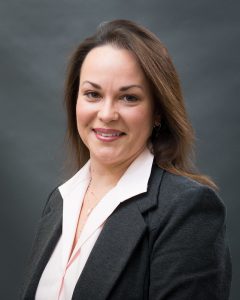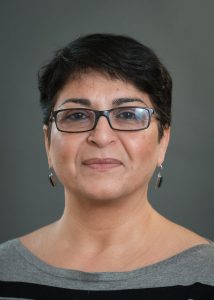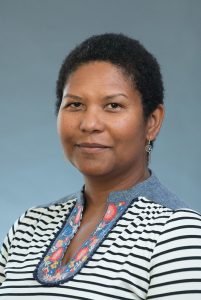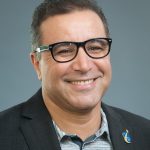NECC Partners with French Universities
In the midst of a pandemic, five Northern Essex Community College professors spent the fall 2021 semester creating partnerships with two French universities, that will provide a global experience for students without the need for travel.
The professors have been collaborating with French professors, developing joint projects that will be conducted virtually between students and professors in the Merrimack Valley and France, using the latest web technologies. The four to 12-week projects will take place this semester, the spring of 2022.
Northern Essex began to explore these partnerships—called international virtual exchange (IVE) programs—shortly before COVID became a reality.
While they aren’t designed to replace study abroad, they do offer a global experience for students who can’t study abroad because of a global pandemic or work or family commitments, says Melba Acevedo, the college’s director of instructional technology and online education, who is focusing her doctoral thesis on this topic.
“This program is not a substitute for study abroad. It’s designed to expose students who may not have that opportunity, to the benefits of collaborating with students and faculty in other countries.”
Benefits of IVE
IVE programs help students build their technology skills as well as their global competency, qualities that are in high demand in the 21st-century workplace.
After participating in a global interdisciplinary project, students will have developed their intercultural competence and acquired specific technological tools needed to collaborate in an international workforce.
For faculty, who commit to working with their international peers to develop the curriculum, the benefits are similar. In addition to building cultural competency and learning new technologies, they hone their teaching practices and learn new pedagogical methods.
Northern Essex Business Professor Sheila Muller has been collaborating with an English Professor in France to develop a project for her marketing course that compares the shopping experience in France to that of the United States, using mystery shoppers.
“The experience has energized my own teaching. We come from different backgrounds but have the same challenges,” she says.
How It Started at NECC
With almost three decades of experience in instructional technology at a community college, Acevedo became interested in IVE while working on her doctorate. In 2019, she was attending a conference on the topic and invited Northern Essex Science Professor Emily Gonzalez to join her. As a former exchange student and having grown up with a parent who collaborated with scientists across the globe, Gonzalez had an interest in creating international collaborative experiences for her Northern Essex students.
“Communicating with folks living in geographically and culturally different areas opens up educational and career possibilities and helps make the world smaller,” she says.
At the conference, Gonzalez and Acevedo connected with a professor from Champlain College in Quebec, who eventually directed them to Gazelle International, a nonprofit organization which helps colleges develop international virtual exchange programs. Thanks to Gazelle International, Northern Essex was able to partner with the two French Universities, the Université Paris-Saclay and the Université de Lorraine.
What’s Planned at NECC
Acevedo invited Northern Essex faculty who had an interest in a virtual international exchange to participate. Five professors were selected, including Emily Gonzalez, Anatomy & Physiology; Sheila Muller, Principles of Marketing; Liliana Brand, Calculus II; Habib Maagoul, Differential Equations; and Lis Espinoza, American Literature II.
For the past few months, faculty have been meeting virtually to develop the curriculum. As Acevedo explains, it’s complicated joining students across geographic and cultural areas. In addition to determining learning outcomes and deciding what technologies to use, faculty need to figure out how they are going to collaborate in real time while in different international time zones.
Professor Gonzalez is partnering with Christelle Boulanger, an English professor and Franck Wilmot, an electronics professor. After discussion, they decided on a project that will culminate with the creation of a video explaining how heart sensors and skeletal muscular sensors collect and ultimately display data.
Students will be required to communicate concepts of chemistry/anatomy and physiology/electronics and the Northern Essex students will also mentor the French students on the English language.
“Our project will require students to not only demonstrate an understanding of concepts, but also to become proficient in the use of technology,” says Gonzalez. “We wanted to select a project that would allow our students to apply knowledge from their coursework to their potential career goals.”
Bringing the International Experience to Students of Color
According to the Open Doors Report on International Educational Exchange, only 5.3% of undergraduate students in the United States go overseas as part of their degree program, and the students who do go abroad are likely to be White (70%) with only 10.6% Latino and 5.5% Black or African American.
At Northern Essex, the student population is 44% Hispanic and 72% of students are studying part time, while working full or part time to support themselves and their families.
“We hope this is the beginning of something we can grow at Northern Essex and provide more opportunities for students and faculty,” says Acevedo. “It will complement the short term and semester-long study abroad programs that we will offer again when the world opens back up.”
To learn more about international virtual education opportunities at Northern Essex, contact Acevedo, at macevedo@necc.mass.edu.
Northern Essex Community College has campuses in both Haverhill and Lawrence. It offers approximately 60 associate degree and certificate programs as well as hundreds of noncredit courses designed for personal enrichment and career growth. Each year, 6,000 students are enrolled in credit associate degree and certificate programs on the Haverhill and Lawrence campuses; and another 2,000 take noncredit workforce development and community education classes on campus, and at businesses and community sites across the Merrimack Valley. For more information, visit the website at www.necc.mass.edu or call 978-556-3700.
- Habib Maagoul, Math Professor
- Liliana Brand, Math Professor
- Lis Espinoza, English Professor












